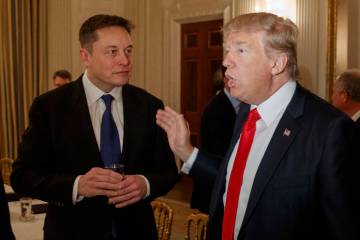EDITORIAL: U.S. government climate report omits context necessary to judge the conclusions
Critics have accused President Donald Trump and Republicans of being “anti-science,” particularly when it comes to global warming. It’s worth noting, then, that the White House made no attempt to manipulate a U.S. government report on climate change released last week.
“Despite fears by some scientists and environmental advocates,” The Associated Press reported Saturday, “David Fahey of the National Oceanic and Atmospheric Administration and several authors said there was no political interference or censoring of the 477-page report.”
Indeed, it appears the only “censoring” of information was done by those who actually produced the document.
The report concludes that “evidence of global warming is stronger than ever,” the AP reveals. Among the findings: Since 1900, the Earth has warmed by 1.8 degrees and seas have risen 8 inches; extreme weather, including heat waves, downpours and wildfires, have become more common.
But in a scathing Wall Street Journal opinion piece published Friday, Steven E. Koonin argues that the report fails to offer a “complete portrayal” of the science and lacks the context necessary to draw reasonable conclusions. Mr. Koonin implies that the document’s implicit alarmism is intended to drive a political agenda.
Mr. Koonin notes, for instance, that “buried deep in the report is a figure showing that heat waves are no more frequent today than in 1900.“ As for sea levels, “The report ominously notes that while global sea level rose an average 0.05 inch a year during most of the 20th century, it has risen at about twice that rate since 1993,” Mr. Koonin writes. “But if fails to mention that the rate fluctuated by comparable amounts several times during the 20th century.”
The rate of recent increases in sea levels is “statistically indistinguishable” from peak rates in the early 1900s, he explains.
Nobody can smear Mr. Koonin with the “denier” label. He acknowledges the reality of a changing climate and is a theoretical physicist who served as undersecretary of energy for science during the first term of the Obama administration. He is currently on the faculty of New York University.
Mr. Koonin argues the report contains “data misrepresentations” that “violate basic scientific norms.” Why would that be? Why would the authors omit data that would help frame the issue? Could there be, heaven forfend, a political agenda at play?
Mr. Koonin cites the late physicist Richard Feynman, who “admonished scientists to discuss objectively all the relevant evidence, even that which does not support the narrative” and concludes, “That’s the difference between science and advocacy.”
The politicization of science is indeed troubling. But as Mr. Koonin highlights, there’s nothing “anti-science” about casting a skeptical eye on the climate change doomsayers.

















